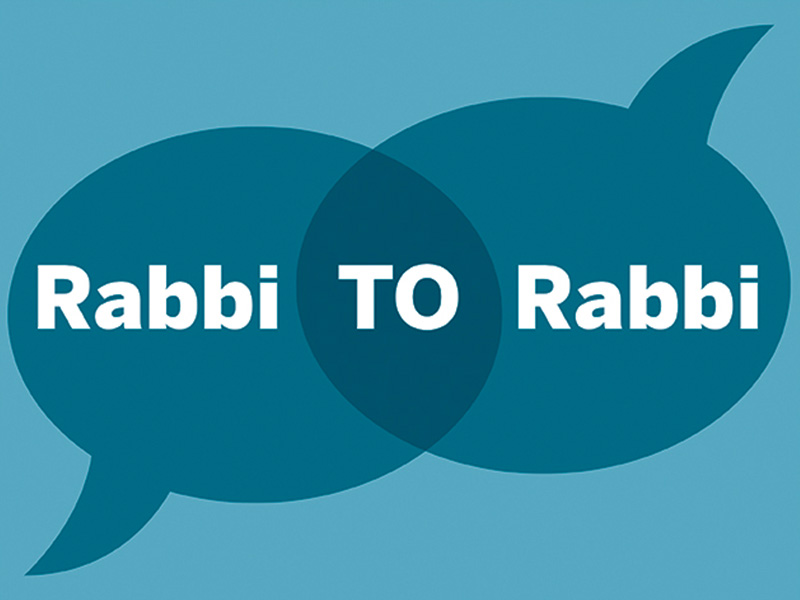Are they the fulfilment of Divine will or a means to personal growth? Or does becoming more complete human beings allow us to serve God in a more complete sense?
Rabbi Adam Cutler
Beth Tzedec Congregation, Toronto
Rabbi Adam Scheier
Congregation Shaar Hashomayim, Montreal
Rabbi Cutler: At a recent lecture I attended, the instructor positioned two great Orthodox Jewish thinkers of the modern era in opposition to each other with respect to whether or not the mitzvot are meant to “do something” for the doer.
For Rabbi Joseph Soloveitchik, a committed mitzvah-laden life leads one to know God and to cleave to God. For Yeshayahu Leibowitz, however, fulfilment of mitzvot, while mandatory, should not provide the doer with any increase in knowledge or personal satisfaction beyond the recognition of submitting to the will of God.
Each of us encourage our communities to increase in personal Jewish commitment. Much of this commitment is in the form of mitzvot, understood classically as sacred obligations or commandments of God to the Jewish People.
Why do you feel compelled to fulfil mitzvot? How do explain their purposes to your community?
Rabbi Scheier: That’s a fascinating question, and the two philosophical approaches you present are compelling. However, there is a third approach that I turn to when articulating the opportunities found in commmandedness.
Whereas the positions you mention emphasize connecting with God and submitting to God’s will, there is also the aspect of connecting with oneself. I hear this approach in the words of Rabbi Abraham Isaac HaKohen Kook, who speaks of the “primary repentance” as the illuminating act that focuses one on the purest form of him or herself.
Simply put, I believe that living with a Jewish consciousness – which, for me, includes a meticulous observance of the commandments – makes me a better human being. It asks me to keep my eyes open for opportunities to help others and to allow myself the opportunity to spiritually and intellectually grow, and thereby serve God.
Rabbi Cutler: Like you, I appreciate an approach to mitzvot that highlights their ability to bring about personal growth. However, when mitzvah observance is grounded solely in self-actualization, that poses significant challenges.
First, it turns the individual inward, potentially to the point of overwhelming self-interest. Second, it risks distancing us from the observance of individual mitzvot for which we find no personal meaning. In an era of almost unlimited personal autonomy, I find it comforting to have a system, which at its root, is presented as obligatory.
There is a chassidic teaching that the word “mitzvah” is related to the Aramaic word tsavta, meaning togetherness. When one performs a mitzvah, she brings herself together with Jews past, present and future. She also connects herself to God.
Ultimately, I appreciate the words of Jewish Theological Seminary of America Chancellor Arnold Eisen: “[C]ommandment is not an adequate translation of mitzvah, any more than good deed captures the matter. Mitzvah means so much more than either of these. It is, like Torah itself, a pattern, an ennobling source of wholeness, a way.”
When I sit down with my community and discuss mitzvot, I don’t feel bound to any one of the many (and sometimes conflicting) reasons for observance. Rather, I hope to connect individuals Jews with thinkers who resonate and inspire them to growing observance.
Rabbi Scheier: As we contemplate different philosophical paths for understanding mitzvot – whether it is a fulfilment of Divine will or a means to personal growth – by no means should they be seen as mutually exclusive. Becoming a more complete human being allows me to serve God in a more complete sense, which brings us in full circle to the concept of commandedness.
And, as we engage in this discussion, I reflect that I rarely discuss the overall concept of commandedness. I am much more likely to speak about the reason for particular commandments than about the logic behind being commanded to do anything. That is, it’s easier to focus on the specifics of a mitzvah than to contemplate why God establishes expectations for us in the first place. Perhaps it is a mistake to take core principles for granted, such as belief in God and the authority of the Divine Torah, which are the framework for the system of mitzvot.
Your words lead me to the awareness that, in addressing my congregation in speech or writing, I rarely translate or elaborate on the word mitzvah. Perhaps it’s a mistake to take for granted that the word’s nuances are common knowledge.
